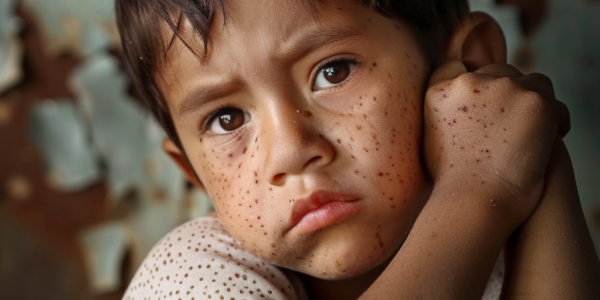CDC Study Shows Significant Increase in ADHD Diagnoses Among Children in the U.S.
Recent data from the CDC shows a concerning rise in ADHD diagnoses among children in the US, with 7 million kids previously diagnosed in 2022. The study reveals that 10.5% of children currently have ADHD, with many also experiencing co-occurring conditions. Only 53.6% of children with ADHD are using medication, highlighting potential gaps in treatment.
Debunking the Myth: Does Sugar Really Cause Hyperactivity in Kids?
Is sugar really to blame for hyperactive kids? While excessive sugar consumption can have negative effects on brain function, current scientific evidence does not support the notion that sugar directly causes hyperactivity in children. The myth of sugar-induced hyperactivity can be traced back to studies from the 1970s and 1980s, but the link between sugar and hyperactivity remains inconclusive. Parents should focus on providing nutritious meals and snacks for their children to support their overall health and well-being.
Emotion Dysregulation as Neuropsychological Pathway to ADHD Revealed in Study
A recent study reveals a significant association between emotion dysregulation and ADHD symptoms, indicating an emotional pathway contributing to ADHD. This pathway was linked to immune responses and enhanced the accuracy of classifying cases and controls in a clinical sample. Understanding the emotional components of ADHD is crucial for developing more effective treatment strategies.
Rise in ADHD Diagnoses Among Women and Girls
Recent trends show a significant increase in ADHD diagnoses among women and girls, highlighting a shift in understanding and awareness of the condition. Experts note a doubling of ADHD diagnoses in women from 2020 to 2022, potentially linked to underdiagnosis due to societal norms and expectations. Recognizing subtle signs like difficulty focusing and hyper-focusing on specific topics is crucial for accurate diagnosis and treatment, emphasizing the importance of raising awareness about ADHD in women.
Debate sparked by Joe Wicks’ comments on ADHD and diet
The recent comments by fitness guru Joe Wicks on the potential link between diet and ADHD in children have sparked a heated debate among experts and individuals affected by the condition. While Joe Wicks highlighted the impact of diet on behavior, critics emphasize the complex nature of ADHD, including genetic and neurochemical factors. Understanding and empathy towards individuals with ADHD are crucial in creating a supportive and inclusive environment.
Comprehensive Review of ADHD Treatments in Children and Adolescents
A recent study published in Pediatrics reviewed treatment options for ADHD in children and adolescents, identifying effective interventions and highlighting the growing availability of treatments. The study assessed various medications, including traditional stimulants and nonstimulants, as well as behavioral ADHD therapies. The findings emphasize the need for a comprehensive approach to effectively manage ADHD symptoms in young individuals.
Link Between Eczema and Cognitive Impairment in Children
Recent research has revealed a concerning link between eczema and cognitive impairment in children with neurodevelopmental comorbidities. The study, published in Jama Dermatology, examined a weighted sample of over 69.7 million U.S. children, of which 13.2% had atopic dermatitis. The findings indicated that children with neurodevelopmental comorbidities, such as ADHD or learning disabilities, faced a two to threefold higher risk of cognitive impairment when they also had eczema. These findings shed light on the potential cognitive implications of eczema in children with neurodevelopmental comorbidities, emphasizing the significance of comprehensive assessments and further research to better understand and address these associations.
Brighton Author Raises Concerns About ADHD Medication Shortage
Brighton author and comedian, Lorelei Mathias, raises concerns about the shortage of medication for ADHD patients, emphasizing the toll it takes on individuals. CEO of ADHD UK, Henry Shelford, criticizes the government’s response, highlighting extensive waiting lists for treatment. As the call for an overhaul of the system gains momentum, it is evident that the ADHD medication shortage has had a significant impact on patients, prompting concerns and demands for swift and effective solutions.
Study Suggests Individuals with ADHD-like Traits May Have Evolutionary Foraging Advantage
A new study suggests that individuals with ADHD-like traits may have an evolutionary advantage when it comes to foraging for food in the wild. The research indicates that people with attention deficit hyperactivity disorder (ADHD) characteristics, such as difficulty regulating their attention and restlessness, exhibit better foraging strategies compared to those with neurotypical traits. Neuroscientist David Barack and his team conducted an experiment involving 457 participants, revealing that individuals without ADHD tended to stay too long at a berry bush, resulting in suboptimal foraging. On the other hand, those with ADHD-like traits were more likely to leave a patch sooner and less likely to exploit any one berry bush, ultimately collecting more berries overall.
ADHD Diagnosis Process in Pittsburgh Area
ADHD: Understanding the Diagnosis Process and Support Options in Pittsburgh Area January 18, 2024 If you’ve ever wondered if your child has ADHD, you’re not alone. It can be hard to know whether a backpack stuffed with forgotten permission slips…










